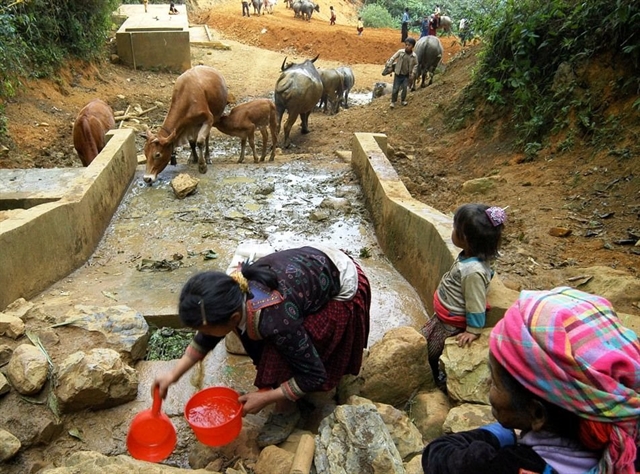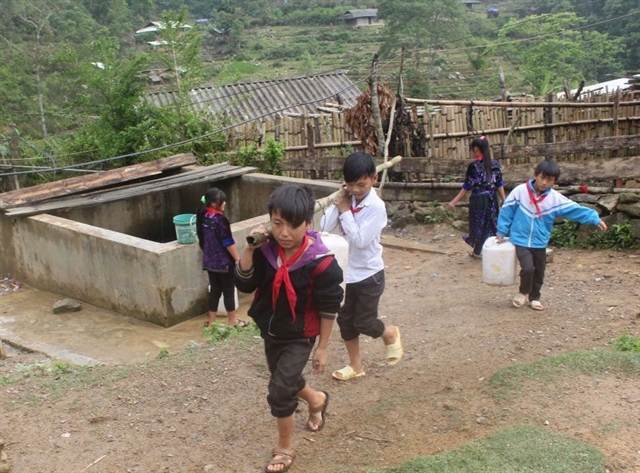 Society
Society


|
| Mông ethnic people collect water from a stream in Điện Biên province. Photo baotainguyenmoitruong.vn |
ĐIỆN BIÊN — Watching the weather forecast on television, Sấu Pó worries about the possible losses that his family would suffer in this year's crop.
Many places on the map are red - the colour signalling hot weather with rising temperatures.
"What's wrong? When will it rain? Pó said.
"People have improved the land and waited for rain to sow seeds. Mông ethnic people will be hungry if it doesn't rain by the end of this month. Local people will have to go far, into the forest to find water.”
For many months, people living in Tủa Chùa District, Điện Biên Province, have been waiting for water, Tài Nguyên & Môi Trường (Natural Resources and Environment) online newspaper reported.
As the dry season comes, more than 60,000 people living in Tủa Chùa District’s hilly areas, face the brunt of a water crisis.
To have fresh water for daily use, local leaders and even residents hired workers to drill wells, but to no avail.
Sometimes, they have to drill tens of metres to find water. But it's very little, just enough to make people less disappointed because they have to spend tens of millions of đồng to drill a well.
There are 12 communes and townships in Tủa Chùa District. The whole area is in a serious shortage of water.
There is only one water supply plant with a capacity of 2,000 cu.m a day in Tủa Chùa Township. It can only meet about 90 per cent of water for daily use, temporarily supplying enough water for about 8,000 inhabitants of the township.
Locals in the remaining 11 communes depend entirely on streams, lakes and wells.
In Trung Thu, Lao Xả Phình, Sín Chải, Tả Sìn Thàng communes are in serious water shortage. Families only have one thing on their mind – finding water.
Nguyễn Văn Đạt, head of the district's Agriculture and Rural Development Department, said: "Last week, residents in Tủa Chùa Township had no water because the lakes are drying. And now is growing season, local farmers use water from lakes for farming."
"All lakes in Tủa Chùa District have a capacity ranging from 1,000cu.m to 5,000cu.m."
According to the assessment of the geological teams, some lakes have groundwater such as Pó, Tông Lệnh, Nậm Seo and Chiếu Tính.
However, it takes a lot of money to turn a natural lake into a reservoir, they said.
“Nậm Seo and Chiếu Tính lakes can supply water for the entire Tủa Chùa Township and eight neighbouring communes if they are turned into reservoirs,” said Lường Tuấn Anh, chairman of the district People's Committee.
“That is also the most sustainable solution to ensure water security in the future.
"The whole district faces severe water shortage in dry season. Residents have to go to find water nearly ten kilometres away from home. I am very sad to see secondary students carrying plastic cans in groups to go to get water after school."
In 2022, the province proposed to the Ministry of Agriculture and Rural Development build water reservoirs to ensure water security, including water projects for Tủa Chùa District. However, nothing has changed yet so far.
Vùi Văn Nguyện, secretary of Tủa Chùa District Party Committee, said: "We have only one wish. 60,000 people in Tủa Chùa district will have enough water to live and develop the agro-forestry economy. Everything from the people's health to the economy depends on water. Drought will seriously affect us."

|
| Students travel over a kilometre to fetch water after school. Photo baotainguyenmoitruong.vn |
According to a report by the provincial Department of Natural Resources and Environment (DNRE), there are nine clean water supply systems in the province, located in Điện Biên Phủ city, Mường Lay Township and District of Tuần Giáo, Tủa Chùa, Mường Nhé, Điện Biên, Mường Ảng, Mường Chà and Điện Biên Đông, with a total design capacity of 31,100cu.m per day.
Currently, the water supply capacity of the plants is about 19,180cu.m a day, about 67.6 per cent of the total design capacity.
Only Điện Biên Phủ City and some localities benefit from this water system.
Trần Thị Thanh Phượng, deputy director of DNRE, said the depletion of surface water and groundwater is taking place in some mountain communes in the districts of Điện Biên Đông, Tủa Chùa, and Nậm Pồ, leading to water shortages and affecting people's daily lives.
The impact of climate change has increased extreme weather phenomena, prolonged heavy rain causing landslides and affecting the quality of water sources in rivers and streams.
The rapid growth of economy, population and urban areas has also led an increasing demand for clean water.
The wasteful use of water along with improper discharge of waste and environment pollution has also directly affected the quality and water supply capacity of plants in Điện Biên Province.
In order to ensure water security and to limit the depletion of both surface water and underground water resources, the province approved the list of water resources that need to be protected and strengthens the management of water resources, Phương said. VNS




